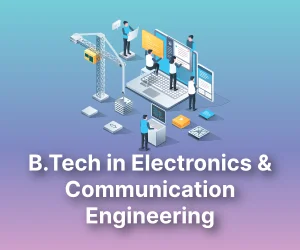
Online B.Tech After Diploma in Electronics and Communication Engineering
Link copied to ClipboardOnline B.Tech in Electronics and Communication Engineering working professionals allows diploma holders
Highlights
Offered By -4 Universities
Course Duration - 4 years
Get more information about
Online B.Tech After Diploma in Electronics and Communication Engineering
Fill in these details and unveil the power of Online B.Tech After Diploma in Electronics and Communication Engineering
Your Personal Data is safe with us.
Online B.Tech After Diploma in Electronics and Communication Engineering : Overview
Electronics and Communication Engineering designs, develops, and tests electronic systems and communication networks. This online B.Tech in ECE (Lateral Entry) program allows diploma holders and working professionals to upgrade their qualifications while continuing their jobs.
This 3-3.5 year course provides in-depth knowledge of core ECE subjects, including analog/digital circuits, microprocessors, signal processing, control systems, communication systems, electromagnetic theory, etc. There is a significant focus on practical training through extensive lab sessions using the latest equipment and software. The program aims to build strong technical competency and practical engineering skills to excel in core industry verticals dealing with communication networks, embedded devices, VLSI systems, etc. The blended delivery methodology offers flexibility to balance work and academics. The course culminates in a significant project and internship for applying classroom learning to solving real-world problems. Overall, the program develops highly skilled ECE engineers ready to take on challenges and make an impact.
Key highlights Of B.Tech In Electronics & Communication Engineering After Diploma (Lateral Entry)
- It is approved by UGC and AICTE, ensuring high standards and wide acceptance across academia and industry. The blended format provides flexibility.
- Comprehensive coverage of core ECE concepts - analog/digital electronics, microprocessors, signal processing, communications, electromagnetics, VLSI, etc.
- Highly experienced faculty with industry backgrounds provide in-depth knowledge of concepts and practical perspectives tuned to current industry requirements.
- Access to online learning resources like video lectures, tools, and discussion forums that enable self-paced learning aligned with the schedules of working professionals.
- Extensive hands-on training through lab sessions focused on the latest equipment, hardware design, programming, debugging, prototyping, etc., to build practical solid engineering skills.
- Industry projects and internships facilitate applying theoretical knowledge in solving real-world problems and gaining valuable work experience.
Eligibility Criteria For B.Tech In Electronics & Communication Engineering After Diploma (Lateral Entry)
To be eligible, the applicant must hold a full-time 3-year diploma in electronics and communication or allied engineering branch from a recognized technical board with a minimum of 50% aggregate marks. Applicants currently employed in relevant industries are preferred. There are no age restrictions. Basic computer skills are required, along with an aptitude for online learning in a self-directed manner.
Also Read: BTech: Full form, Admission 2024, Fees, Syllabus, Entrance Exam & Career Scope
Other Specialization in Online B.Tech After Diploma
| Computer Science Engineering | Mechanical Engineering |
| Civil Engineering | Mechanical and Automobile Engineering |
| Electrical Engineering |
Career Opportunities After Completion Of B.Tech In Electronics & Communication Engineering After Diploma (Lateral Entry)
- Electronics system design engineers research, design, develop, and test various electronic systems and components. They work across domains like consumer electronics, telecom, aerospace, automotive, and medical electronics. The role involves PCB design, embedded programming, equipment handling, prototyping, testing, and debugging electronic systems.
- VLSI engineers use sophisticated EDA software tools to design complex integrated circuits and chipsets. They are involved in digital/analog circuit design, logic verification, physical layout, signal analysis, prototype testing, and tapeout. VLSI is an exciting career opportunity in the semiconductor industry and technology companies.
- Embedded software developers create application software and firmware for microcontroller-based systems integrated into various products. The role requires strong programming skills, interfacing sensors/actuators, prototyping, and testing skills for developing reliable real-time embedded devices.
- Network engineers design, configure, test, troubleshoot, and upgrade wired and wireless enterprise and telecom carrier networks. They ensure optimized and secure network operations to provide seamless services to end users. The role offers opportunities across IT firms as well as telecom service providers.
- Technical support engineers install, administer, troubleshoot, and provide maintenance and tech support for an organization’s IT infrastructure, including networks, servers, databases, software systems, etc. They enable optimized and uninterrupted technology and business operations through their support.
Also Read: JEE Mains 2024 Result Updates: Cutoff, Merit List, Scores, and More.


